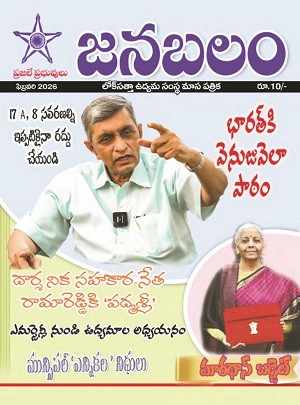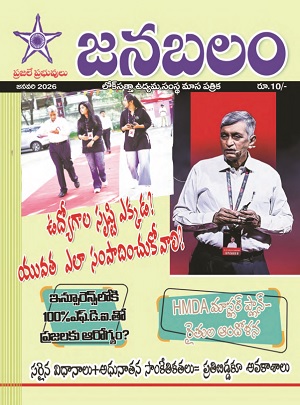Questioning of the allotment of the ‘whistle’ symbol to the Lok Satta Party by TDP leaders amounts to showing disrespect to the judiciary and the Election Commission, Lok Satta Party President Dr. Jayaprakash Narayan declared here today.
Dr. JP pointed out that the allotment of the free symbol followed the judgment of the Andhra Pradesh High Court in a writ petition filed by party. The party had to approach the High Court since the Election Commission of India had denied its plea for a common symbol to all of its candidates in the 2009 general elections to the Lok Sabha and the Assembly. The Election Commission contended that as per its 1968 order only a recognized political party would be entitled to reserve a symbol for exclusive allotment to the candidates set up by it. Since the Lok Satta Party was not a recognized political party, the Election Commission maintained, it was not eligible for a common symbol. (To be recognized a political party, it must contest in the general elections and secure a certain minimum percentage of votes or number of seats).
The Lok Satta Party, seeking the allotment of the whistle symbol, told the High Court that as the majority of the voters are illiterate or semi-literate a common symbol was necessary, more so when elections to the Lok Sabha and the Assembly were conducted simultaneously. “The ballot paper does not even contain the name of the political party on behalf of which the candidate is contesting and in such a situation it is only the symbol, which would be the guiding factor for an illiterate/semi-literate voter,” argued the Lok Satta. As the Hon’ble High Court pointed out, “The exercise of franchise by the vast majority of the electorate, which is illiterate, or semiliterate at best, would necessarily be conditioned by the symbol professed by the candidate / political party contesting the election. …” The Court pointed out that the voter should be clear in his mind as to his informed choice, and such a choice would necessarily be guided by the symbol allotted to the party.
A Division Bench of the High Court comprising Justice V. Eswaraiah and Justice P. V. Sanjay Kumar in its judgment said, “There is no rationale in not considering the allotment of a common symbol out of the free symbols available to the unrecognized parties, so as to guarantee proper identification by the voter. … Confusion created by allotment of different symbols to candidates contesting from the same political party would invariably have the effect of damaging the process of free and fair elections, which is the avowed objective of the efforts and endeavors of the Election Commission.” The Court observed that the paramount consideration is to ensure free and fair elections, where every candidate and party shall have an equal opportunity to effectively participate in the election process enabling him to seek mandate of the political masters (people).
The High Court drew a distinction between reserving a symbol to a recognized party as a right, and allotting a common symbol to a serious registered party intending to contest elections on a large scale, in order to facilitate free and fair elections, and informed choice of voters. The court observed, “The bar sought to be placed on the allotment of a common symbol to a party, thereby diluting its potential to aspire for the political mandate, would in fact be debilitative of the very fundamentals of free and fair elections.
Dr JP pointed out that in the WP No. 3212 of 2009 before AP High Court, both the Election Commission of India and the State Election Commission (SEC) of AP were cited as respondents by Lok Satta. The court’s argument and observations hold good for Lok Sabha, Assembly and local elections, and apply to both the Election Commission of India and the State Election Commission.
The High Court in its March 2009 judgment suspended the January 2009 order of the Election Commission of India denying a common symbol and directed it to reconsider the application of the Lok Satta and similarly situated unrecognized registered political parties for a common symbol. The Supreme Court in a similar case wanted the Election Commission to give a common symbol to the Lok Satta Party and the Praja Rajyam Party among others.
Dr. JP said he could not understand why a party like the TDP which had a quarter century of history behind it was obsessed with the Lok Satta Party, which has a lone member in the Assembly and polled less than two percent of the popular vote. Accusing the Lok Satta of colluding with the Congress, blaming it for TDP’s debacle, questioning its credentials to be a party, conspiring to deny a common symbol to be able to go to people, and asking voters not to vote for the Lok Satta lest it should hurt the TDP show that the party is haunted by the Lok Satta specter.
Dr. JP made it clear that the Lok Satta had been formed not to support or oppose either the Congress or the TDP or any other political party. Lok Satta’s focus is not other parties, but the people and their lives. “For traditional parties practicing politics as commerce, politics and public life are about the candidates and leaders and their families. For us, politics is about the agenda we articulate and power is merely a means. The moment power becomes an end in itself, we become one with the traditional parties which are a part of the problem. “There is no need for the Lok Satta to exist if it were to join the very parties, which are responsible for the sorry state of affairs.”
The Lok Satta is approaching GHMC voters with a clear-cut agenda aimed at transforming their living conditions in five years and not on a negative propaganda.
Wednesday, July 22, 2009
Controversy over 'whistle' Unwarranted: Dr. JP
Subscribe to:
Post Comments (Atom)





No comments:
Post a Comment